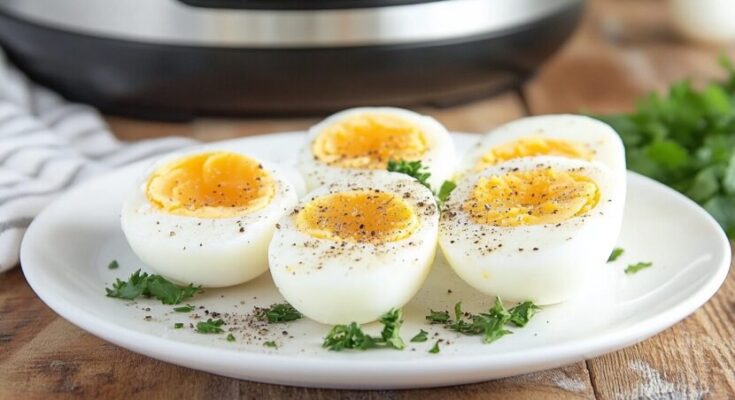Boiled Eggs Recipe: Boiled eggs are a staple in kitchens around the world, offering convenience, nutrition, and versatility. Whether you’re in need of a quick protein-packed breakfast or looking for a salad topping, boiled eggs have got you covered.
Plus, they can be prepared to match different taste preferences, from runny yolks to fully-cooked centers. So, let’s dive into a foolproof guide to make perfectly boiled eggs every time.
Types of Boiled Eggs Based on Cooking Time
The texture of boiled eggs can vary depending on how long they are cooked. Here’s a breakdown of the types of boiled eggs:
1. Soft-Boiled Eggs: These have a runny yolk and soft white. They’re ideal for dipping toast soldiers and take about 5-7 minutes to cook.
2. Medium-Boiled Eggs: These have a slightly jammy yolk with a firm yet tender white. Medium-boiled eggs take about 8-9 minutes to cook.
3. Hard-Boiled Eggs: Perfect for salads and sandwiches, hard-boiled eggs have fully cooked yolks and whites. They take 10-12 minutes to achieve doneness.
Understanding these types helps ensure you get the perfect egg for your needs.
Ingredients Required
Making boiled eggs is incredibly simple when it comes to ingredients.
Main Ingredients:
- Fresh eggs (as many as needed)
- Water (enough to cover the eggs)
Optional Ingredients:
- Salt (to season during peeling)
- Vinegar (optional for preventing cracks)
Essential Kitchen Tools
Before getting started, it’s helpful to have the right tools on hand:
- Pot or Saucepan: Large enough to hold the eggs without overcrowding
- Timer: To ensure precise cooking time
- Slotted Spoon: Useful for removing eggs from hot water without breaking them
Having these tools ready will make the process smoother.
Step-by-Step Instructions for Making Perfect Boiled Eggs
Step 1: Choosing the Right Eggs
Start by selecting fresh, high-quality eggs. However, slightly older eggs tend to peel more easily than very fresh ones.
Step 2: Preparing the Water
Place a pot on the stove and add enough water to cover the eggs by at least an inch. Bring the water to a gentle simmer. Adding a teaspoon of vinegar can help prevent cracks.
Step 3: Placing Eggs in Water
Using a slotted spoon, gently lower the eggs into the pot. Be cautious to prevent the eggs from cracking due to sudden temperature changes.
Step 4: Boiling the Eggs
Once the eggs are in the water, increase the heat to bring it to a full boil.
Step 5: Timing Based on Desired Doneness
Start your timer as soon as the water reaches a rolling boil. Follow these guidelines:
- Soft-Boiled: 5-7 minutes
- Medium-Boiled: 8-9 minutes
- Hard-Boiled: 10-12 minutes
Step 6: Removing and Cooling the Eggs
After the timer goes off, transfer the eggs to an ice bath or place them under cold running water. This halts the cooking process and makes peeling easier.
Peeling the Eggs Easily
Peeling boiled eggs can be tricky, but these tips can help:
- Use older eggs, as they peel more easily than fresh eggs.
- Tap the egg gently on a hard surface to create cracks all over the shell.
- Peel the egg under running water to help remove stubborn bits of shell.
Avoid peeling eggs while they’re too warm, as this can cause the whites to tear.
How to Test Egg Doneness
Wondering if your egg is cooked perfectly? Here’s how to check:
- Spin Test: Spin the egg on a flat surface. Hard-boiled eggs spin smoothly, while soft-boiled eggs wobble.
- Cut Test: Slice the egg in half to visually check the yolk’s consistency.
By using these simple methods, you can ensure the eggs meet your expectations.
Common Mistakes to Avoid When Boiling Eggs
Even with a simple recipe, mistakes can happen. Here’s what to watch out for:
- Overcooking: Overcooked eggs develop a greenish ring around the yolk and may have a rubbery texture.
- Skipping the Ice Bath: Not cooling the eggs quickly leads to overcooking and makes peeling harder.
Following the right timing and cooling steps ensures success every time.
Health Benefits of Boiled Eggs
Boiled eggs are not only tasty but also a powerhouse of nutrition. They provide essential vitamins, minerals, and protein that support overall health. Here’s why adding boiled eggs to your diet is a smart choice:
1. High in Protein: Eggs are a complete protein source, containing all nine essential amino acids. Protein helps in muscle repair, boosts metabolism, and keeps you feeling full for longer.
2. Rich in Vitamins and Minerals: Boiled eggs are packed with vitamins B2 (riboflavin), B12, D, and minerals like selenium and phosphorus, which promote healthy bones, energy production, and immune function.
3. Brain Health: The choline found in eggs is vital for brain development and cognitive function. It’s particularly beneficial for pregnant women and young children.
4. Supports Eye Health: Eggs contain lutein and zeaxanthin, antioxidants that protect against cataracts and age-related macular degeneration.
Including a couple of boiled eggs in your daily routine can significantly improve your health over time.
Creative Uses for Boiled Eggs
If plain boiled eggs aren’t exciting enough, try these creative ways to incorporate them into your meals:
1. Salad Toppings: Add sliced boiled eggs to green salads for a protein boost. They pair wonderfully with fresh vegetables, avocado, and croutons.
2. Egg Sandwiches: Mash boiled eggs with mayonnaise, salt, and pepper to make a creamy egg salad. Use it as a filling for sandwiches or wraps.
3. Deviled Eggs: Halve hard-boiled eggs, scoop out the yolks, and mix them with mustard, mayonnaise, and paprika. Refill the egg whites for a tasty appetizer.
4. Ramen Topping: Add a soft-boiled egg with a runny yolk to a bowl of ramen for an authentic touch.
Boiled eggs can transform your everyday meals, making them more satisfying and nutritious.
Tips for Storing Boiled Eggs
Proper storage is crucial to maintain the freshness and safety of boiled eggs. Here are some guidelines to follow:
1. Refrigeration: Boiled eggs should be stored in the refrigerator within two hours of cooking. Unpeeled eggs last up to a week, while peeled eggs should be consumed within three days.
2. Store in an Airtight Container: If you’ve already peeled the eggs, place them in an airtight container with a damp paper towel to prevent them from drying out.
3. Avoid Freezing: Freezing boiled eggs is not recommended, as the whites develop a rubbery texture when thawed.
By following these storage tips, you can enjoy your boiled eggs safely and for a longer period.
Frequently Asked Questions About Boiling Eggs
1. How can I prevent eggs from cracking during boiling?
Avoid rapid temperature changes. Start by placing the eggs in room-temperature water and gradually bring it to a boil. Adding a bit of vinegar can also strengthen the shell.
2. Why are my boiled eggs difficult to peel?
Fresh eggs are harder to peel because the inner membrane clings tightly to the shell. Using slightly older eggs and cooling them in an ice bath after boiling can make peeling easier.
3. Can boiled eggs be frozen?
While it’s possible to freeze egg yolks, freezing whole boiled eggs isn’t ideal due to the rubbery texture of thawed egg whites.
4. What causes the green ring around the yolk?
This is a result of overcooking. The green ring forms when sulfur from the egg white reacts with iron in the yolk. Proper timing and an ice bath can prevent this.
5. How long do boiled eggs last?
Unpeeled boiled eggs last about a week in the refrigerator. Peeled eggs should be consumed within three days for the best taste and safety.
Common Egg Myths Debunked
1. Are brown eggs healthier than white eggs?
Nope! The color of an eggshell has no impact on its nutritional value. It’s simply a result of the hen’s breed. Both brown and white eggs offer the same health benefits.
2. Does adding salt or vinegar to the water help?
Adding vinegar can help prevent cracks by strengthening the eggshell, but salt does not have much impact on boiling eggs.
3. Do eggs raise cholesterol levels?
Recent studies suggest that moderate egg consumption does not significantly increase cholesterol for most people. In fact, eggs can be part of a heart-healthy diet.
Debunking these myths can help you make more informed choices when it comes to eggs.
Recipe Variations and Add-ons
1. Spiced Boiled Eggs: After peeling, sprinkle the eggs with salt, pepper, and paprika for a spicy twist. You can also coat them with a bit of olive oil and chili flakes for extra flavor.
2. Pickled Boiled Eggs: Marinate boiled eggs in a mixture of vinegar, water, sugar, and spices. After a few days in the refrigerator, they develop a tangy, flavorful kick that pairs well with charcuterie boards.
3. Herb-Infused Eggs: Before serving, garnish boiled eggs with fresh herbs like parsley, chives, or dill. This adds a burst of freshness and aroma.
These variations allow you to experiment and add variety to your boiled egg routine.
FAQs about Boiled Eggs Recipe
How long should I boil eggs?
The perfect boiling time for eggs depends on your preference. For soft-boiled eggs, boil for 4-6 minutes. For medium-boiled eggs, aim for 6-9 minutes. For hard-boiled eggs, boil for 9-12 minutes. Start timing once the water begins to boil and ensure the eggs are submerged in water.
How do I make peeling boiled eggs easier?
To make peeling easier, add a pinch of salt to the boiling water. After boiling, immediately transfer the eggs to an ice-water bath for several minutes to cool them down and stop the cooking process. This also helps the shell separate from the egg.
Can I boil eggs starting with cold water?
Yes, you can start boiling eggs in cold water. Place the eggs in a saucepan, cover them with cold water by an inch, and slowly bring to a boil over medium heat. This method can help prevent the eggs from cracking and ensure even cooking.
How can I tell if an egg is boiled?
To check if an egg is boiled, spin it on a flat surface. If it spins smoothly without wobbling, it’s boiled. If it wobbles or spins slowly, it may need more cooking time.
Is it necessary to use old eggs for boiling?
While not necessary, using slightly older eggs can help make peeling easier. Fresh eggs tend to have a tighter bond between the shell and the inner membrane, making them more difficult to peel.
Conclusion
Boiled eggs are a simple yet highly versatile food. By following the step-by-step instructions, you can achieve the perfect texture every time, whether you prefer a soft, medium, or hard boil. They’re packed with protein, vitamins, and essential nutrients that promote overall health. Best of all, they’re quick to prepare and adaptable to countless recipes.
So, the next time you’re looking for a nutritious, fuss-free meal or snack, boil a few eggs and get creative with your toppings and flavors!



